8 Ways Your Childhood Shapes How You Love:
As children, we learn how to interact with others through our parents and caretakers. Attachment theory suggests that we learn how to form relationships by observing our caregivers and then adopting their behaviors as our own.
We see how they handle conflict, express love, and communicate their needs. So it’s no surprise that these behaviors carry over into our romantic relationships as adults.
Remember that parents came from somewhere too. Since we typically model our behaviors after those closest to us, it’s essential to consider what your parents were taught as children. If they’re not perfect, it’s because no one taught them better.
- Were their methods of communication helpful?
- How did they handle conflict?
- Is there anything you can learn from their mistakes?
Taking the time to reflect on your parents’ interactions with each other and the world around them, can give you insight into your own behavior and provide clues to any struggles in your current relationship.
Look at the following 8 ways, how your childhood affects love styles and try to identify which ones might be influencing your current love style and romantic relationship:
1. Dominant Emotional Theme
Pay attention to the emotions that are dominant in your home when you were growing up. Were there feelings of safety, joy, and contentment? Or did fear, anger, and sadness seem more prominent? How did people talk to each other in your home?
How would you describe the dominant theme of your household?
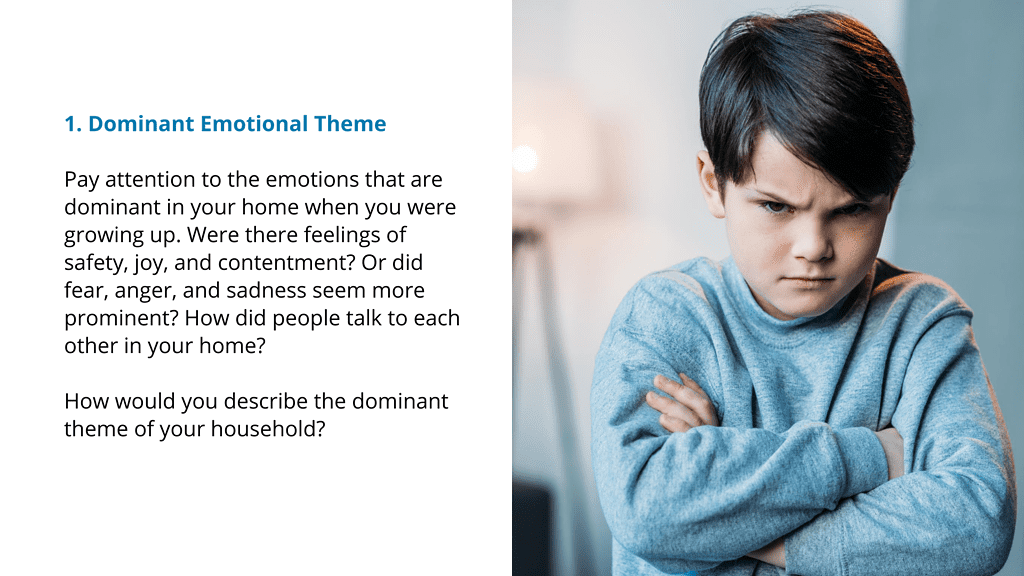
Come up with 3 words or phrases: ___, ___, and ___.
You may be subconsciously recreating similar patterns in your current relationship.
Are you happy with it? If not, ponder what truths were hidden from you when young and make the adjustments needed so that your current partnerships are satisfying, fair, and everlasting.
Figure out which characteristics are most crucial to you and how you should be treated in return.
Come up with 3 preferable words: ___, ___, and ___.
2. Disciplining Style
How did your family communicate? How did your parents discipline you when you exhibited bad behavior?
Was it direct, open, and honest? Were there more screaming matches or calm conversations? Or was there a culture of silence where feelings were left unexpressed and thoughts unshared?
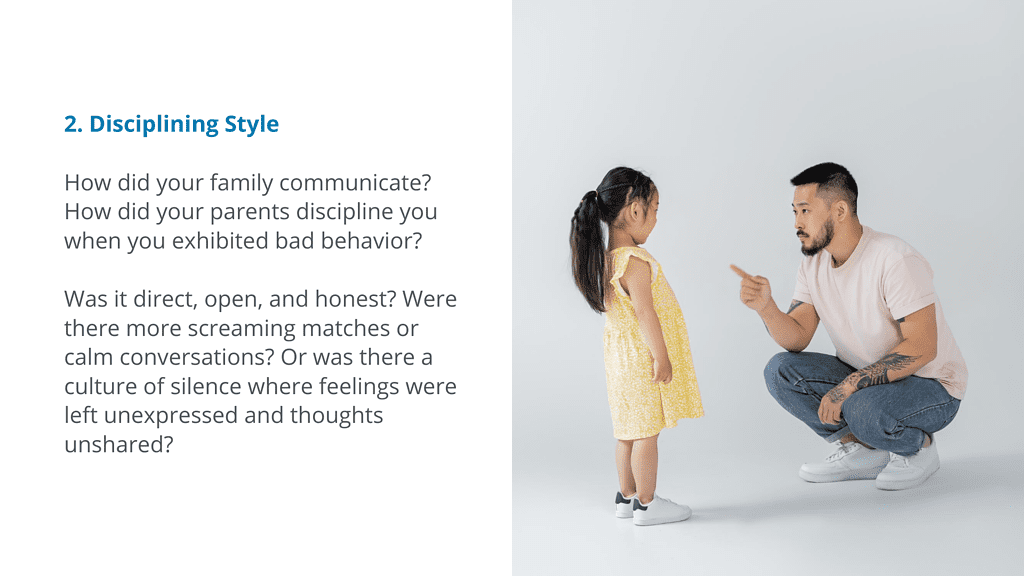
Relationships often sour because of disciplining tactics we learned early in life from authority figures, like:
- Criticism
- Micromanaging
- Neglecting or giving them the silent treatment
- Not listening to the other side
- Dismissing feelings and thoughts
People often try some of these negative tactics and if they’re blocked, they’d end up feeling disempowered.
It’s important to be conscious of your disciplining style in a relationship and make sure you’re not trying to impose it on the other person and choose something more constructive instead.
Through cognitive-behavioral therapy, you can learn to better cope with your reactions to various triggers. This type of therapy asks you to slow down and focus on your reactions to gain a more objective perspective. With CBT, you’ll use your rational brain to consider different options for solving problems, rather than reacting emotionally.
3. Trust
How much trust did you have growing up? Did your parents instill confidence in you that you would always be taken care of, or were there moments when their reliability was questioned?
If children experience their parents’ lack of control or are faced with situations of collapse at home, they learn that the only way to survive is by toughening up and learning how to take care of themselves.
This creates a “control seeker”.

From a young age, they teach themselves not to depend on anyone. Controllers need to feel in charge all the time because it helps them push away the feelings of fear, helplessness, and humiliation. If you remove their sense of control, they are often left feeling exposed and defenseless.
Initially, the spouses of controllers are attracted to their decisiveness and ability to take charge. However, further into the relationship, they might begin feeling unheard or unappreciated.
4. Intimacy
Did you see your parents express intimacy with each other? Did they give each other love and attention or were there moments of neglect and distance?
People who downplay or ignore their emotions probably grew up in an environment where they were not encouraged to express themselves.
Avoiders often grow up in homes without emotion, so they learn to approach situations based on logic instead. Because of this, avoiders are not very good at expressing their love verbally.
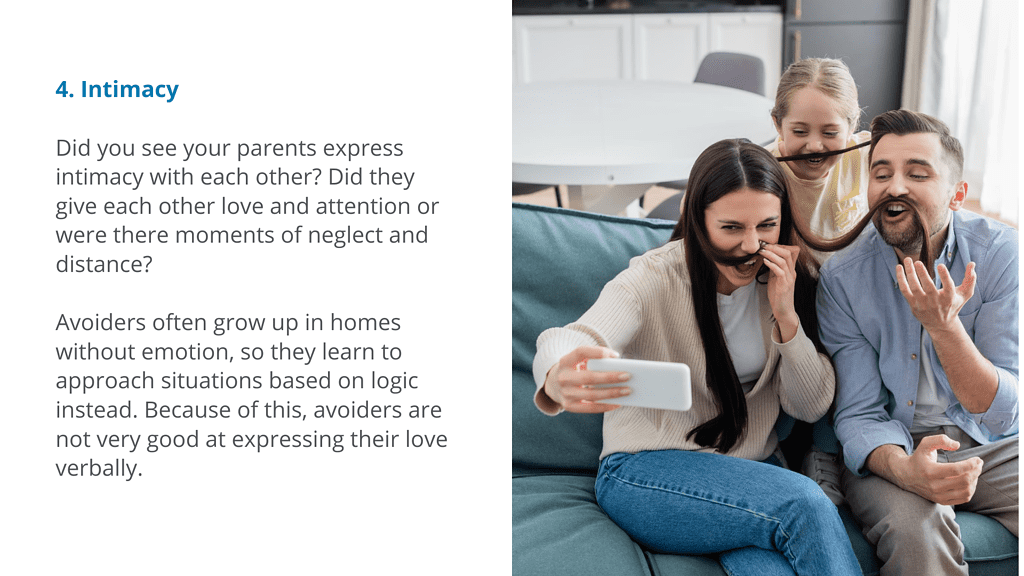
Instead of verbally expressing their love, they prefer to show it in other ways, such as through quality attention, giving gifts, and physical touch.
Their focus is on solutions and performance, rather than on their feelings. As a result, they might spend all their time on work or hobbies, leaving their partner feeling neglected.
In the beginning, those dating or married to an avoider might be attracted by their seeming stability and responsibility. Over time, though, they might feel unneeded and left out of decision-making.
In order to have successful relationships that last, people who tend to avoid emotions need to learn how to communicate and express their emotions with their partner.
5. Aggressive Parent
Children who grow up with an aggressive parent often become people pleasers. They learn that the best way to avoid conflict and punishment is to do whatever the parent wants.
They become good at reading the moods of the parents and try to anticipate what will make them happy. As a result, these children often grow up to be pleasers in their romantic relationships. They are always putting the needs of their partner before their own and they rarely speak up for themselves.
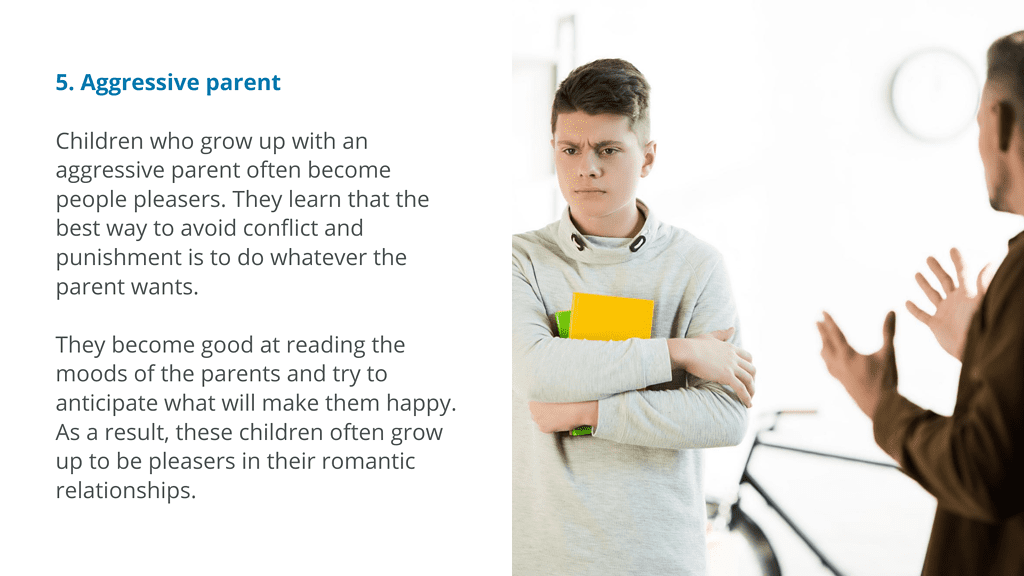
They may feel like they are walking on eggshells around their partner, always afraid of angering them or causing a fight. Sometimes they might even try to avoid a confrontation by lying. This can be emotionally exhausting and lead to a lot of resentment.
If you grew up with an aggressive parent, it’s important to learn how to set boundaries in your relationships and speak up for yourself. You deserve to be treated with respect and kindness, just like everyone else.
6. Prioritisation
How much did your parents prioritize you growing up? Did they pay attention to your needs and show that you were important to them, or did other things come first?
The parent gives the kid just enough attention to make them crave more, but they never get it. From a young age, these children learn that they are not one of their parent’s top priorities.
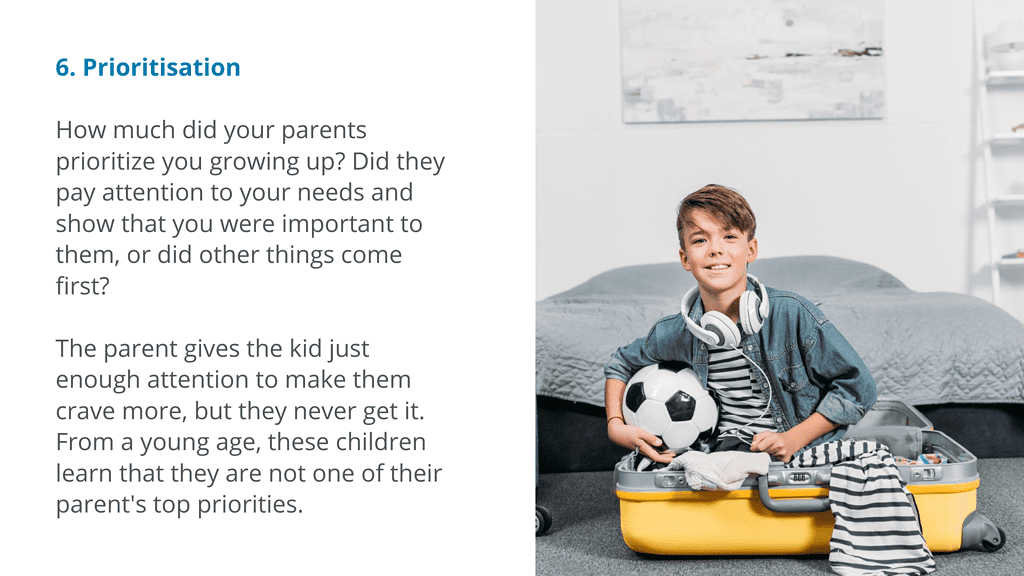
Vacillators often go on a journey to find the solid love and connection in adulthood that they lacked during their childhood. They are highly sensitive to signs of connection and rejection which makes it easy for them to notice even small changes with their partner.
When they enter a new relationship, vacillators may feel as if they have found their true love. As a result, these people tend to dedicate significant time and energy to the partnership during its early stages.
They need to be constantly reassured that they are important and loved. They become too dependent on their adult relationships and have an unrealistic idea of what a relationship should be.
Additionally, spouses of vacillators are often initially attracted to the fact that relationships with this type of person feel very passionate.
Over time, however, the spouse starts feeling like they are not good enough. Even when the spouse does everything right, it doesn’t feel like it’s ever enough. This is because the vacillator has unrealistic expectations of their spouse that are based on an idealized version of them.
This leaves the other spouse scared to upset them because of their constantly changing moods.
On the other hand, the vacillator thinks no one really understands their needs.
If you are in a relationship with someone who is a vacillator, it is important to understand that they are not doing this on purpose. They need constant reassurance that they are loved and important. Try to be understanding of their needs and don’t take their mood swings personally.
It is also important to take the time to set realistic expectations for your relationship and remind yourself that no one can be perfect all the time. With understanding and patience, both partners can find a way to build a strong connection based on mutual trust and respect.
7. Self-Love
How well did your parents love themselves? Did they have healthy self-esteem and confidence or did they suffer from low self-worth? Self-love is essential for developing healthy relationships.
If your parents lacked self-love, chances are you may have inherited their lack of confidence in yourself and your ability to form meaningful connections with others.
In such a case, to achieve a healthy relationship, it is important to learn the art of self-love and cultivate feelings of acceptance, appreciation, and self-worth.
Make sure to take the time to practice self-care, and don’t be afraid to do things that make you feel happy and fulfilled.
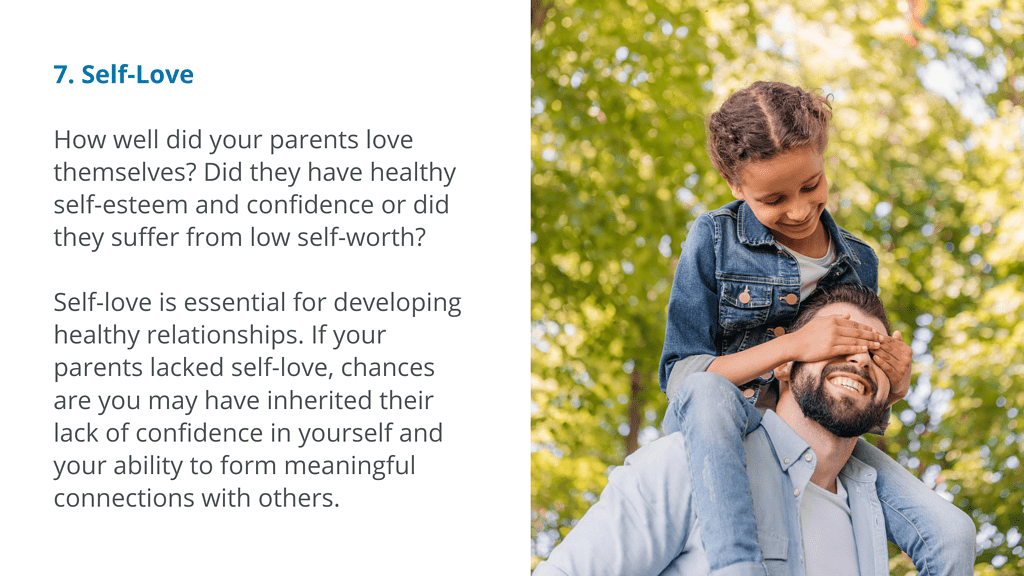
8. Healthy Relationships
If our parents were responsive to us and showed us, love, when we needed it as children, then we are more likely to develop a secure attachment style. As adults, we seek out relationships that mirror the positive aspects of the ones we had with our parents.
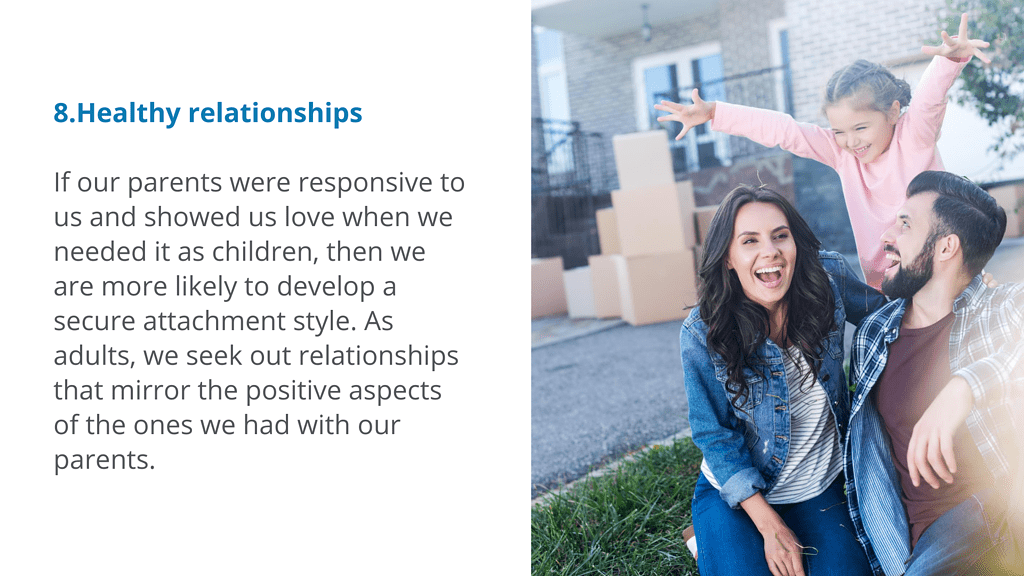
A secure attachment allows you to feel confident and comfortable in your relationship while still maintaining a sense of independence.
A secure connector is someone who feels comfortable both giving and receiving love. They know their own strengths and shortcomings, as well as those of others, allowing them to have healthier relationships free from idealization or devaluation.
If you were raised in an affectionate home with parents who had a happy and healthy relationship, you’re more likely to see love in a positive light.
Let us know in the comments section below, what role did childhood play in your romantic relationships? Share your experiences with us!
Being in a relationship can be one of the most beautiful and fulfilling experiences in life. But for many of us, it can also be a source of stress and frustration. If you’re tired of struggling to connect with your partner, friends, or family members, the Deep Connection Blueprint may be just what you need.
If you’re longing for deeper, more meaningful relationships, the Deep Connection Blueprint can help. This program provides practical tools and guidance for developing authentic, loving, and fulfilling relationships with anyone. Whether you’re looking to improve your communication with your spouse or build closer bonds with your friends, family, or colleagues.
You will learn how to connect with others on a deep level and create lasting connections that go the distance.
The Deep Connection Blueprint program is ideal for singles who are ready to find the love of their life, as well as couples who want to improve their current relationship.
With this program, you will have everything you need to create healthy, happy, and lasting relationships. It comes with a no-questions-asked refund, in case you feel it’s not a perfect fit for you. Enroll today and change your life forever!

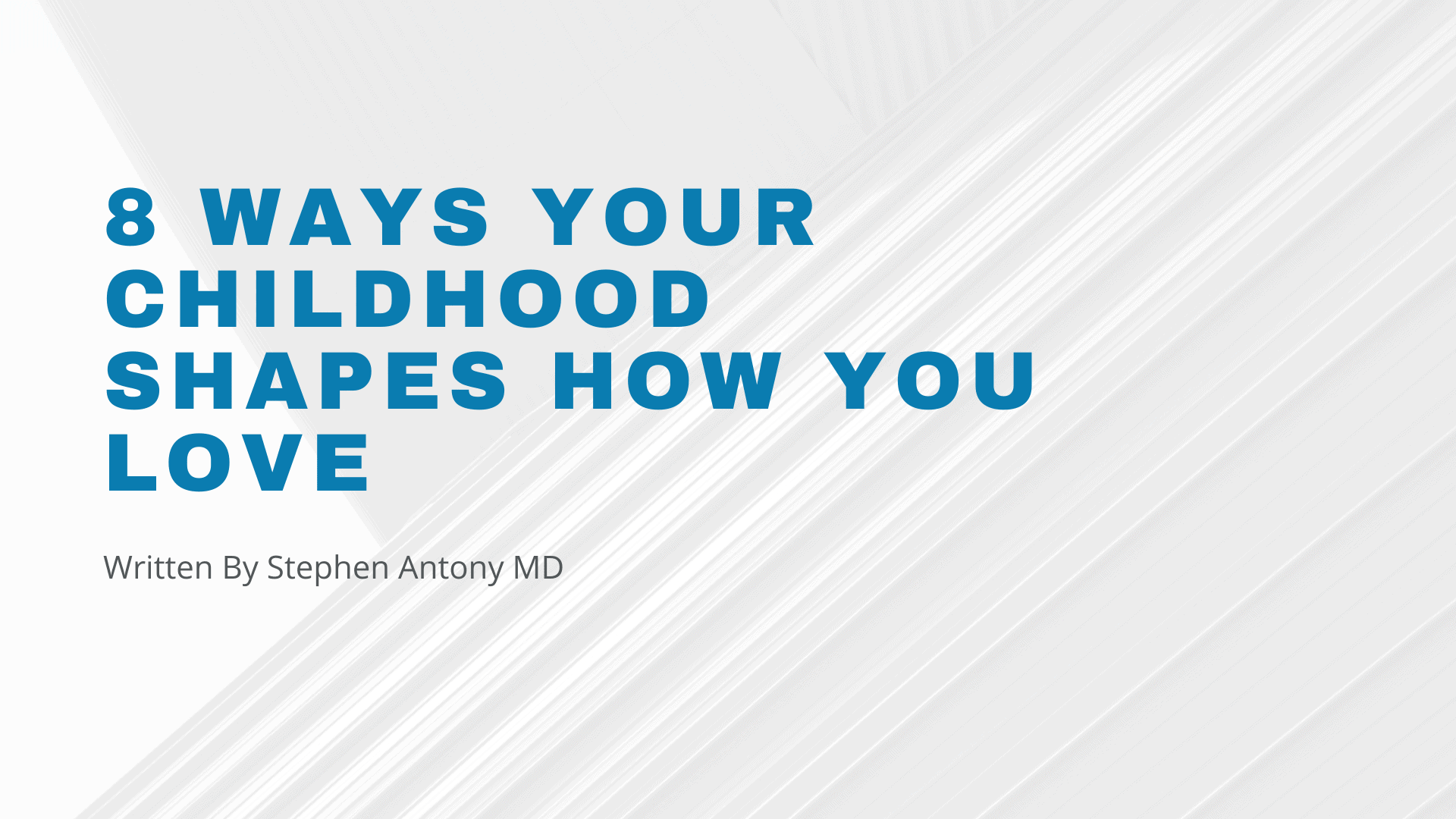







0 Comments